University Finance: Management Accounting Role Change Analysis Report
VerifiedAdded on 2022/08/24
|19
|5528
|37
Report
AI Summary
This report provides a comprehensive analysis of the evolving role of management accounting in modern businesses. It explores the causes behind the changes, including the shift from manufacturing-oriented businesses to more diverse operations and the increasing importance of decision-making based on financial, technical, environmental, ethical, and legal factors. The report examines the various roles of management accountants, such as attention-directing, scorekeeping, and problem-solving, and discusses the resistance to change from different parties within an organization. It also delves into the influence of the finance function, the impact of IT on management accounting, and the steps taken by professional bodies to adapt to these changes. Furthermore, the report discusses the importance of integrating economic reasoning and the role of a management accountant as a business partner. It also highlights the significance of organizational size and structure, and the need for a cultural competence in implementing new management accounting systems. The report concludes by emphasizing the need to institutionalize the new role of a management accountant within an organization to ensure wider recognition and contribution.
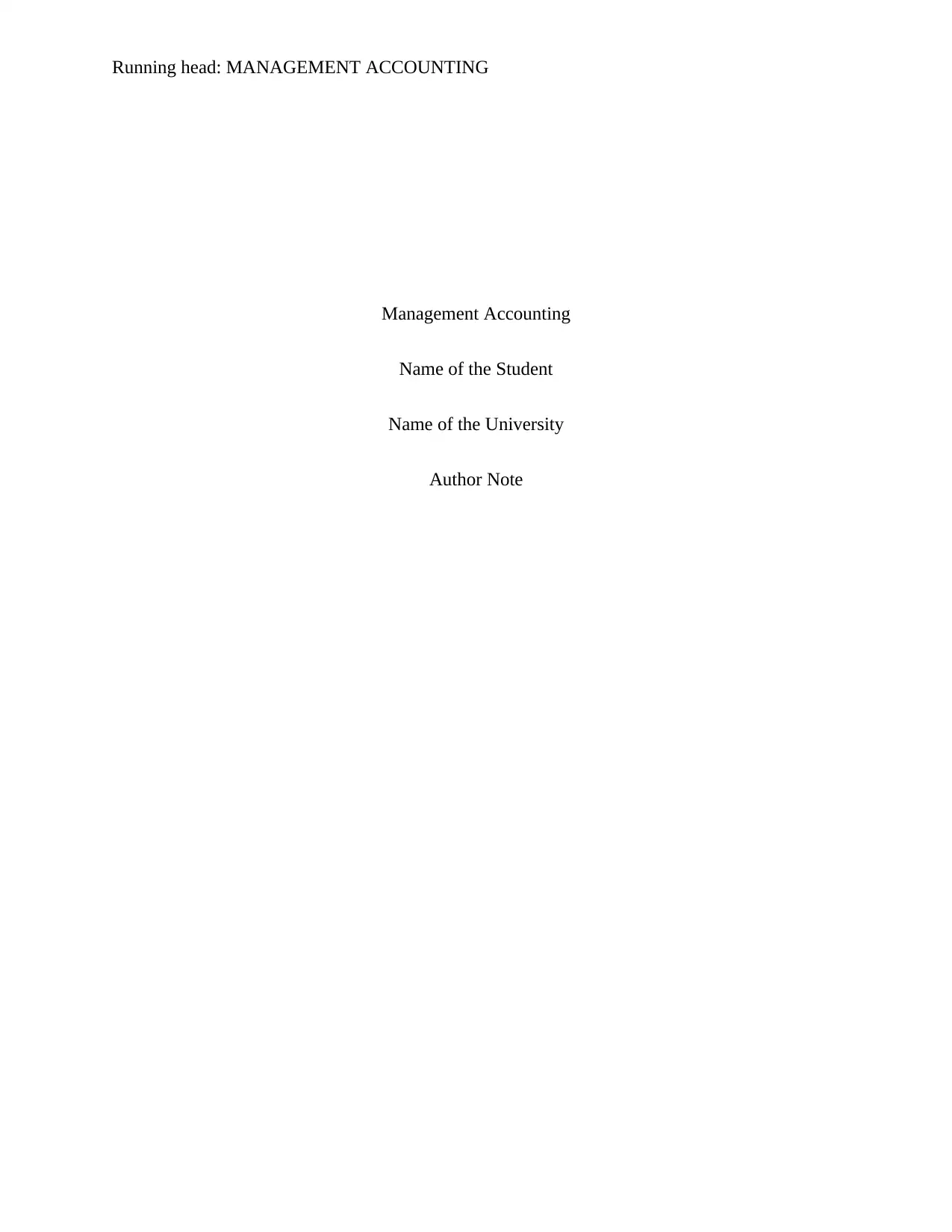
Running head: MANAGEMENT ACCOUNTING
Management Accounting
Name of the Student
Name of the University
Author Note
Management Accounting
Name of the Student
Name of the University
Author Note
Paraphrase This Document
Need a fresh take? Get an instant paraphrase of this document with our AI Paraphraser
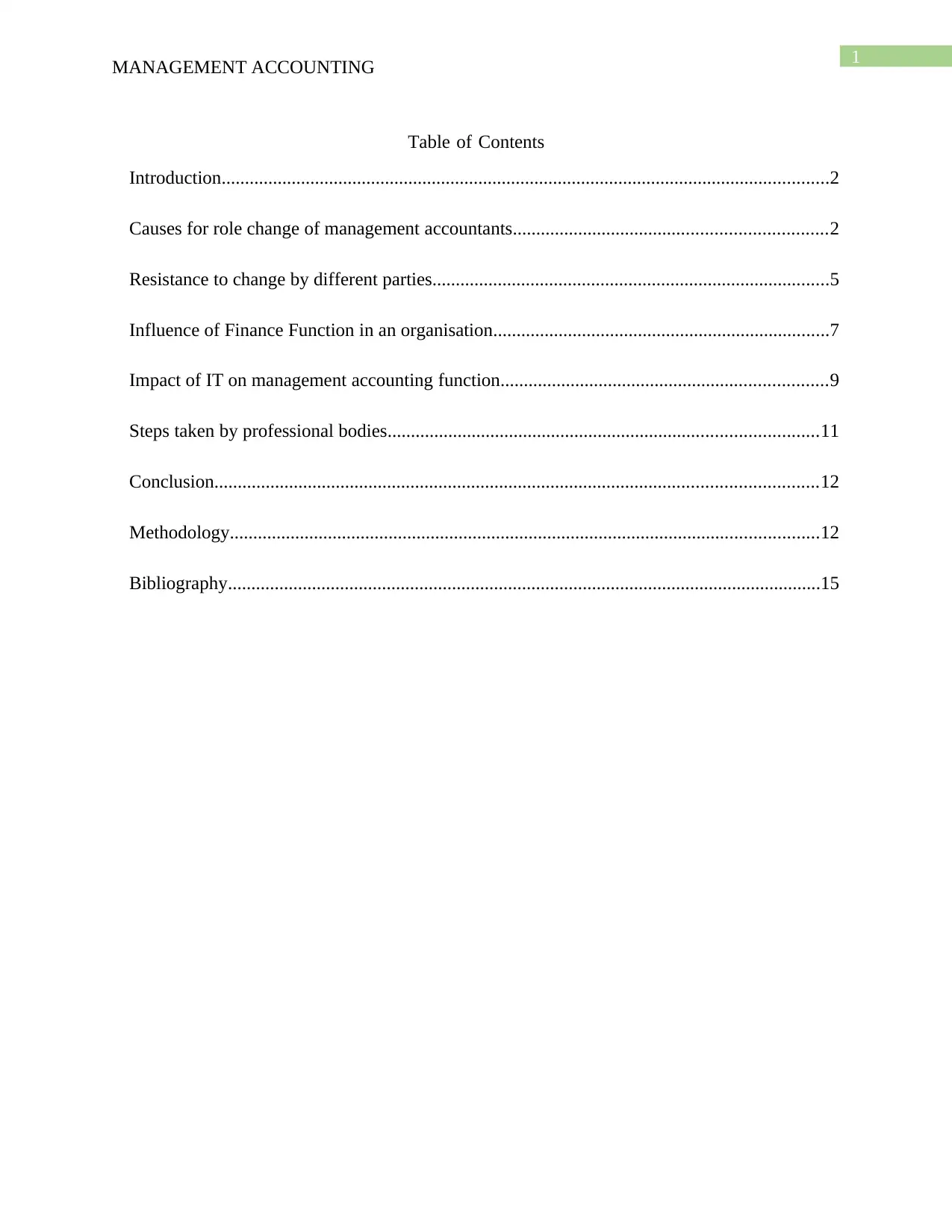
1
MANAGEMENT ACCOUNTING
Table of Contents
Introduction..................................................................................................................................2
Causes for role change of management accountants...................................................................2
Resistance to change by different parties.....................................................................................5
Influence of Finance Function in an organisation........................................................................7
Impact of IT on management accounting function......................................................................9
Steps taken by professional bodies............................................................................................11
Conclusion.................................................................................................................................12
Methodology..............................................................................................................................12
Bibliography...............................................................................................................................15
MANAGEMENT ACCOUNTING
Table of Contents
Introduction..................................................................................................................................2
Causes for role change of management accountants...................................................................2
Resistance to change by different parties.....................................................................................5
Influence of Finance Function in an organisation........................................................................7
Impact of IT on management accounting function......................................................................9
Steps taken by professional bodies............................................................................................11
Conclusion.................................................................................................................................12
Methodology..............................................................................................................................12
Bibliography...............................................................................................................................15
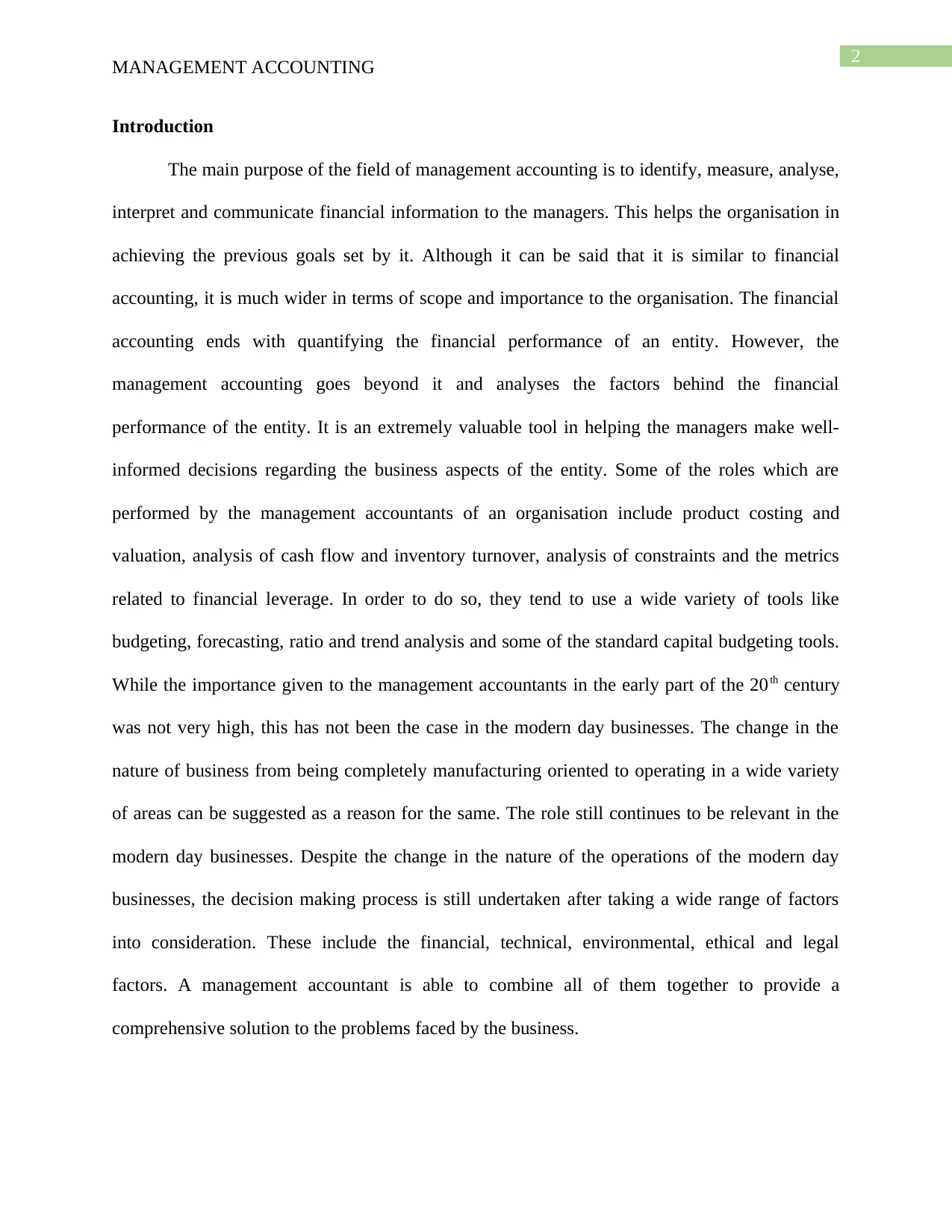
2
MANAGEMENT ACCOUNTING
Introduction
The main purpose of the field of management accounting is to identify, measure, analyse,
interpret and communicate financial information to the managers. This helps the organisation in
achieving the previous goals set by it. Although it can be said that it is similar to financial
accounting, it is much wider in terms of scope and importance to the organisation. The financial
accounting ends with quantifying the financial performance of an entity. However, the
management accounting goes beyond it and analyses the factors behind the financial
performance of the entity. It is an extremely valuable tool in helping the managers make well-
informed decisions regarding the business aspects of the entity. Some of the roles which are
performed by the management accountants of an organisation include product costing and
valuation, analysis of cash flow and inventory turnover, analysis of constraints and the metrics
related to financial leverage. In order to do so, they tend to use a wide variety of tools like
budgeting, forecasting, ratio and trend analysis and some of the standard capital budgeting tools.
While the importance given to the management accountants in the early part of the 20th century
was not very high, this has not been the case in the modern day businesses. The change in the
nature of business from being completely manufacturing oriented to operating in a wide variety
of areas can be suggested as a reason for the same. The role still continues to be relevant in the
modern day businesses. Despite the change in the nature of the operations of the modern day
businesses, the decision making process is still undertaken after taking a wide range of factors
into consideration. These include the financial, technical, environmental, ethical and legal
factors. A management accountant is able to combine all of them together to provide a
comprehensive solution to the problems faced by the business.
MANAGEMENT ACCOUNTING
Introduction
The main purpose of the field of management accounting is to identify, measure, analyse,
interpret and communicate financial information to the managers. This helps the organisation in
achieving the previous goals set by it. Although it can be said that it is similar to financial
accounting, it is much wider in terms of scope and importance to the organisation. The financial
accounting ends with quantifying the financial performance of an entity. However, the
management accounting goes beyond it and analyses the factors behind the financial
performance of the entity. It is an extremely valuable tool in helping the managers make well-
informed decisions regarding the business aspects of the entity. Some of the roles which are
performed by the management accountants of an organisation include product costing and
valuation, analysis of cash flow and inventory turnover, analysis of constraints and the metrics
related to financial leverage. In order to do so, they tend to use a wide variety of tools like
budgeting, forecasting, ratio and trend analysis and some of the standard capital budgeting tools.
While the importance given to the management accountants in the early part of the 20th century
was not very high, this has not been the case in the modern day businesses. The change in the
nature of business from being completely manufacturing oriented to operating in a wide variety
of areas can be suggested as a reason for the same. The role still continues to be relevant in the
modern day businesses. Despite the change in the nature of the operations of the modern day
businesses, the decision making process is still undertaken after taking a wide range of factors
into consideration. These include the financial, technical, environmental, ethical and legal
factors. A management accountant is able to combine all of them together to provide a
comprehensive solution to the problems faced by the business.
⊘ This is a preview!⊘
Do you want full access?
Subscribe today to unlock all pages.

Trusted by 1+ million students worldwide
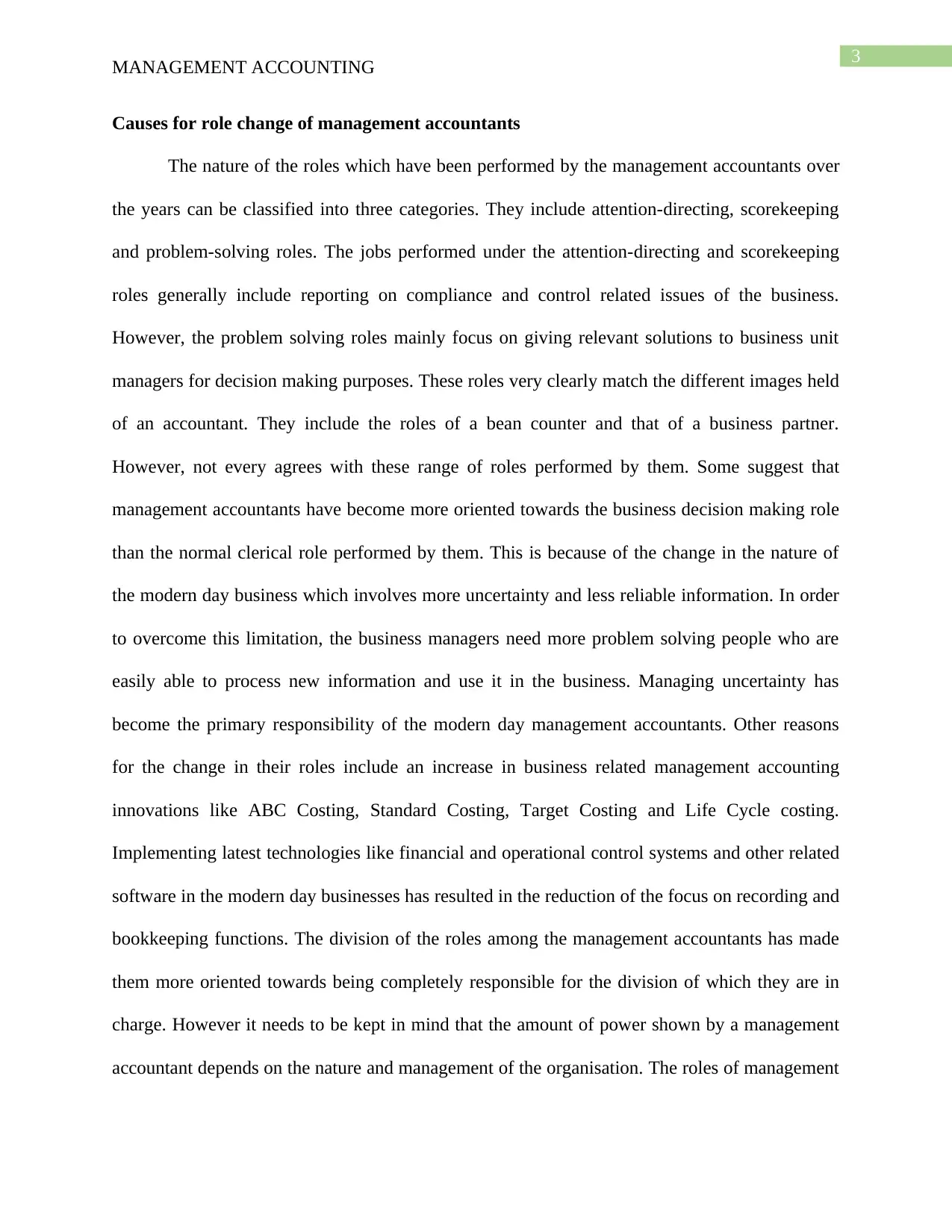
3
MANAGEMENT ACCOUNTING
Causes for role change of management accountants
The nature of the roles which have been performed by the management accountants over
the years can be classified into three categories. They include attention-directing, scorekeeping
and problem-solving roles. The jobs performed under the attention-directing and scorekeeping
roles generally include reporting on compliance and control related issues of the business.
However, the problem solving roles mainly focus on giving relevant solutions to business unit
managers for decision making purposes. These roles very clearly match the different images held
of an accountant. They include the roles of a bean counter and that of a business partner.
However, not every agrees with these range of roles performed by them. Some suggest that
management accountants have become more oriented towards the business decision making role
than the normal clerical role performed by them. This is because of the change in the nature of
the modern day business which involves more uncertainty and less reliable information. In order
to overcome this limitation, the business managers need more problem solving people who are
easily able to process new information and use it in the business. Managing uncertainty has
become the primary responsibility of the modern day management accountants. Other reasons
for the change in their roles include an increase in business related management accounting
innovations like ABC Costing, Standard Costing, Target Costing and Life Cycle costing.
Implementing latest technologies like financial and operational control systems and other related
software in the modern day businesses has resulted in the reduction of the focus on recording and
bookkeeping functions. The division of the roles among the management accountants has made
them more oriented towards being completely responsible for the division of which they are in
charge. However it needs to be kept in mind that the amount of power shown by a management
accountant depends on the nature and management of the organisation. The roles of management
MANAGEMENT ACCOUNTING
Causes for role change of management accountants
The nature of the roles which have been performed by the management accountants over
the years can be classified into three categories. They include attention-directing, scorekeeping
and problem-solving roles. The jobs performed under the attention-directing and scorekeeping
roles generally include reporting on compliance and control related issues of the business.
However, the problem solving roles mainly focus on giving relevant solutions to business unit
managers for decision making purposes. These roles very clearly match the different images held
of an accountant. They include the roles of a bean counter and that of a business partner.
However, not every agrees with these range of roles performed by them. Some suggest that
management accountants have become more oriented towards the business decision making role
than the normal clerical role performed by them. This is because of the change in the nature of
the modern day business which involves more uncertainty and less reliable information. In order
to overcome this limitation, the business managers need more problem solving people who are
easily able to process new information and use it in the business. Managing uncertainty has
become the primary responsibility of the modern day management accountants. Other reasons
for the change in their roles include an increase in business related management accounting
innovations like ABC Costing, Standard Costing, Target Costing and Life Cycle costing.
Implementing latest technologies like financial and operational control systems and other related
software in the modern day businesses has resulted in the reduction of the focus on recording and
bookkeeping functions. The division of the roles among the management accountants has made
them more oriented towards being completely responsible for the division of which they are in
charge. However it needs to be kept in mind that the amount of power shown by a management
accountant depends on the nature and management of the organisation. The roles of management
Paraphrase This Document
Need a fresh take? Get an instant paraphrase of this document with our AI Paraphraser
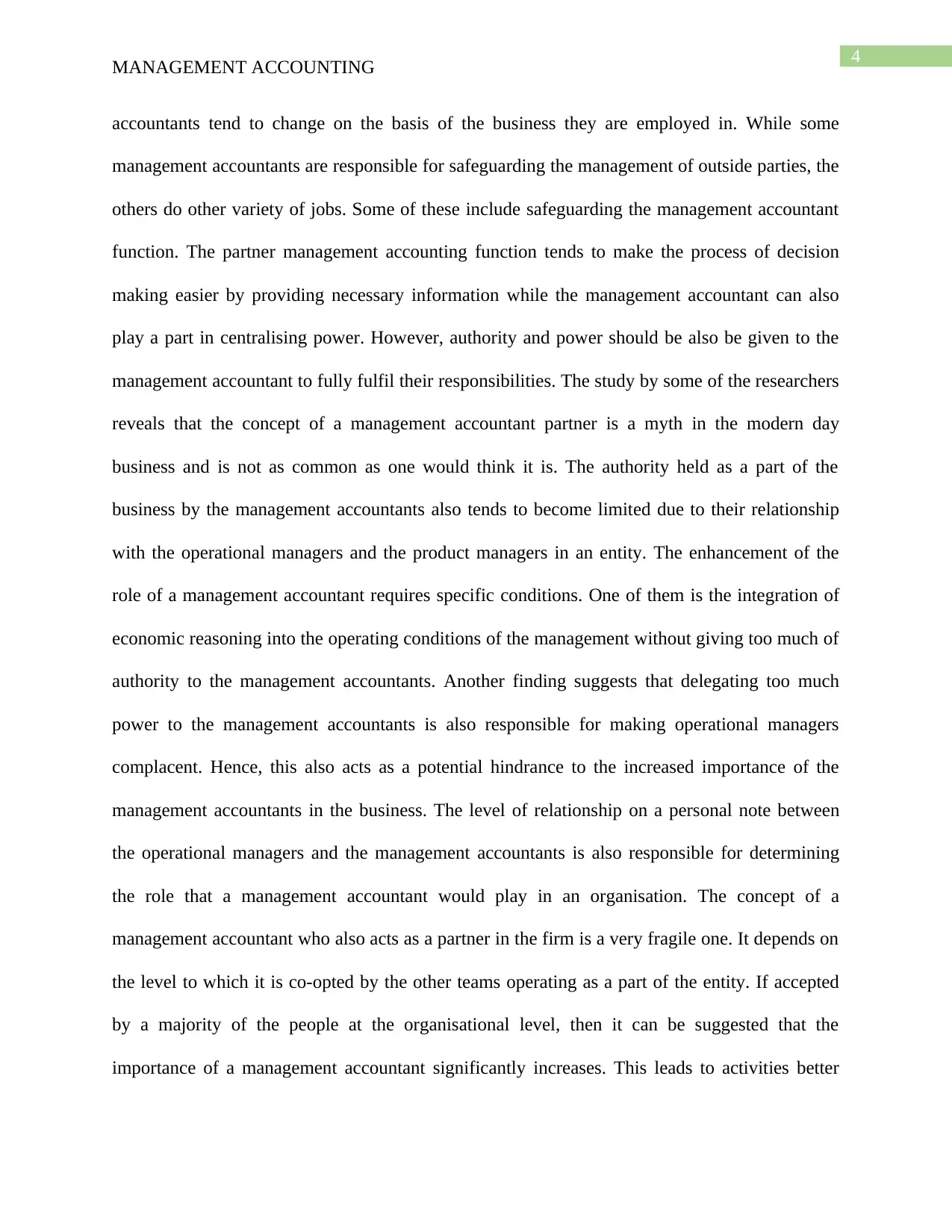
4
MANAGEMENT ACCOUNTING
accountants tend to change on the basis of the business they are employed in. While some
management accountants are responsible for safeguarding the management of outside parties, the
others do other variety of jobs. Some of these include safeguarding the management accountant
function. The partner management accounting function tends to make the process of decision
making easier by providing necessary information while the management accountant can also
play a part in centralising power. However, authority and power should be also be given to the
management accountant to fully fulfil their responsibilities. The study by some of the researchers
reveals that the concept of a management accountant partner is a myth in the modern day
business and is not as common as one would think it is. The authority held as a part of the
business by the management accountants also tends to become limited due to their relationship
with the operational managers and the product managers in an entity. The enhancement of the
role of a management accountant requires specific conditions. One of them is the integration of
economic reasoning into the operating conditions of the management without giving too much of
authority to the management accountants. Another finding suggests that delegating too much
power to the management accountants is also responsible for making operational managers
complacent. Hence, this also acts as a potential hindrance to the increased importance of the
management accountants in the business. The level of relationship on a personal note between
the operational managers and the management accountants is also responsible for determining
the role that a management accountant would play in an organisation. The concept of a
management accountant who also acts as a partner in the firm is a very fragile one. It depends on
the level to which it is co-opted by the other teams operating as a part of the entity. If accepted
by a majority of the people at the organisational level, then it can be suggested that the
importance of a management accountant significantly increases. This leads to activities better
MANAGEMENT ACCOUNTING
accountants tend to change on the basis of the business they are employed in. While some
management accountants are responsible for safeguarding the management of outside parties, the
others do other variety of jobs. Some of these include safeguarding the management accountant
function. The partner management accounting function tends to make the process of decision
making easier by providing necessary information while the management accountant can also
play a part in centralising power. However, authority and power should be also be given to the
management accountant to fully fulfil their responsibilities. The study by some of the researchers
reveals that the concept of a management accountant partner is a myth in the modern day
business and is not as common as one would think it is. The authority held as a part of the
business by the management accountants also tends to become limited due to their relationship
with the operational managers and the product managers in an entity. The enhancement of the
role of a management accountant requires specific conditions. One of them is the integration of
economic reasoning into the operating conditions of the management without giving too much of
authority to the management accountants. Another finding suggests that delegating too much
power to the management accountants is also responsible for making operational managers
complacent. Hence, this also acts as a potential hindrance to the increased importance of the
management accountants in the business. The level of relationship on a personal note between
the operational managers and the management accountants is also responsible for determining
the role that a management accountant would play in an organisation. The concept of a
management accountant who also acts as a partner in the firm is a very fragile one. It depends on
the level to which it is co-opted by the other teams operating as a part of the entity. If accepted
by a majority of the people at the organisational level, then it can be suggested that the
importance of a management accountant significantly increases. This leads to activities better
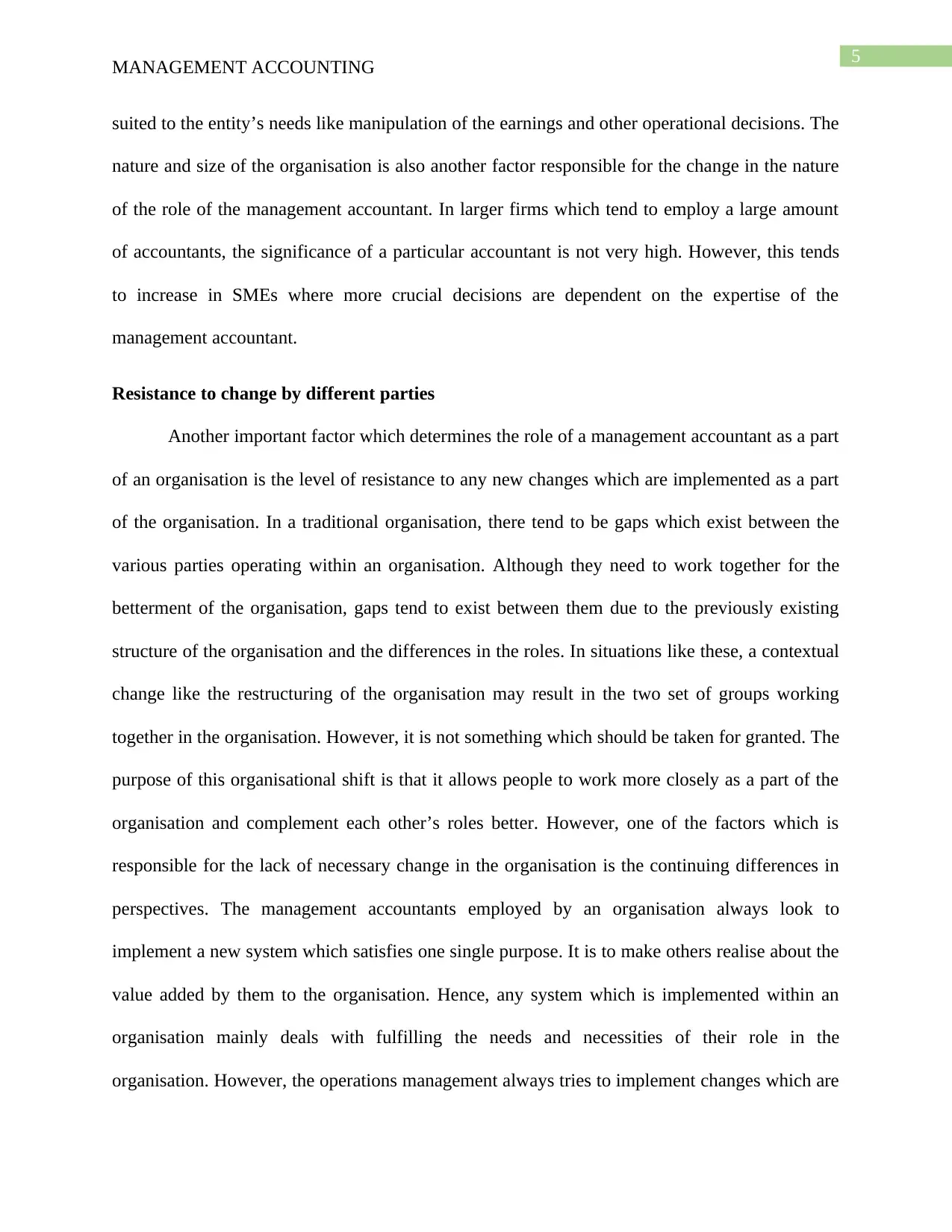
5
MANAGEMENT ACCOUNTING
suited to the entity’s needs like manipulation of the earnings and other operational decisions. The
nature and size of the organisation is also another factor responsible for the change in the nature
of the role of the management accountant. In larger firms which tend to employ a large amount
of accountants, the significance of a particular accountant is not very high. However, this tends
to increase in SMEs where more crucial decisions are dependent on the expertise of the
management accountant.
Resistance to change by different parties
Another important factor which determines the role of a management accountant as a part
of an organisation is the level of resistance to any new changes which are implemented as a part
of the organisation. In a traditional organisation, there tend to be gaps which exist between the
various parties operating within an organisation. Although they need to work together for the
betterment of the organisation, gaps tend to exist between them due to the previously existing
structure of the organisation and the differences in the roles. In situations like these, a contextual
change like the restructuring of the organisation may result in the two set of groups working
together in the organisation. However, it is not something which should be taken for granted. The
purpose of this organisational shift is that it allows people to work more closely as a part of the
organisation and complement each other’s roles better. However, one of the factors which is
responsible for the lack of necessary change in the organisation is the continuing differences in
perspectives. The management accountants employed by an organisation always look to
implement a new system which satisfies one single purpose. It is to make others realise about the
value added by them to the organisation. Hence, any system which is implemented within an
organisation mainly deals with fulfilling the needs and necessities of their role in the
organisation. However, the operations management always tries to implement changes which are
MANAGEMENT ACCOUNTING
suited to the entity’s needs like manipulation of the earnings and other operational decisions. The
nature and size of the organisation is also another factor responsible for the change in the nature
of the role of the management accountant. In larger firms which tend to employ a large amount
of accountants, the significance of a particular accountant is not very high. However, this tends
to increase in SMEs where more crucial decisions are dependent on the expertise of the
management accountant.
Resistance to change by different parties
Another important factor which determines the role of a management accountant as a part
of an organisation is the level of resistance to any new changes which are implemented as a part
of the organisation. In a traditional organisation, there tend to be gaps which exist between the
various parties operating within an organisation. Although they need to work together for the
betterment of the organisation, gaps tend to exist between them due to the previously existing
structure of the organisation and the differences in the roles. In situations like these, a contextual
change like the restructuring of the organisation may result in the two set of groups working
together in the organisation. However, it is not something which should be taken for granted. The
purpose of this organisational shift is that it allows people to work more closely as a part of the
organisation and complement each other’s roles better. However, one of the factors which is
responsible for the lack of necessary change in the organisation is the continuing differences in
perspectives. The management accountants employed by an organisation always look to
implement a new system which satisfies one single purpose. It is to make others realise about the
value added by them to the organisation. Hence, any system which is implemented within an
organisation mainly deals with fulfilling the needs and necessities of their role in the
organisation. However, the operations management always tries to implement changes which are
⊘ This is a preview!⊘
Do you want full access?
Subscribe today to unlock all pages.

Trusted by 1+ million students worldwide
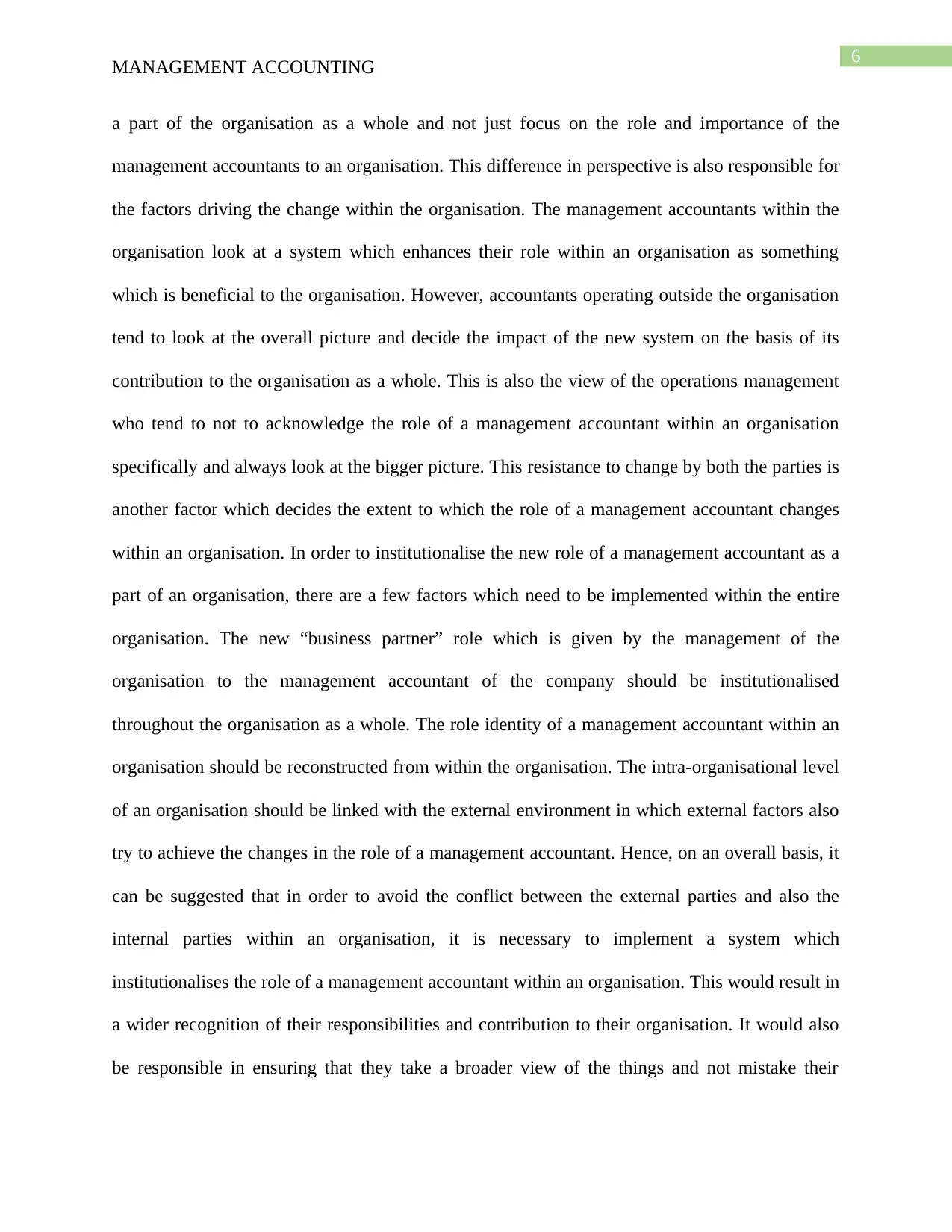
6
MANAGEMENT ACCOUNTING
a part of the organisation as a whole and not just focus on the role and importance of the
management accountants to an organisation. This difference in perspective is also responsible for
the factors driving the change within the organisation. The management accountants within the
organisation look at a system which enhances their role within an organisation as something
which is beneficial to the organisation. However, accountants operating outside the organisation
tend to look at the overall picture and decide the impact of the new system on the basis of its
contribution to the organisation as a whole. This is also the view of the operations management
who tend to not to acknowledge the role of a management accountant within an organisation
specifically and always look at the bigger picture. This resistance to change by both the parties is
another factor which decides the extent to which the role of a management accountant changes
within an organisation. In order to institutionalise the new role of a management accountant as a
part of an organisation, there are a few factors which need to be implemented within the entire
organisation. The new “business partner” role which is given by the management of the
organisation to the management accountant of the company should be institutionalised
throughout the organisation as a whole. The role identity of a management accountant within an
organisation should be reconstructed from within the organisation. The intra-organisational level
of an organisation should be linked with the external environment in which external factors also
try to achieve the changes in the role of a management accountant. Hence, on an overall basis, it
can be suggested that in order to avoid the conflict between the external parties and also the
internal parties within an organisation, it is necessary to implement a system which
institutionalises the role of a management accountant within an organisation. This would result in
a wider recognition of their responsibilities and contribution to their organisation. It would also
be responsible in ensuring that they take a broader view of the things and not mistake their
MANAGEMENT ACCOUNTING
a part of the organisation as a whole and not just focus on the role and importance of the
management accountants to an organisation. This difference in perspective is also responsible for
the factors driving the change within the organisation. The management accountants within the
organisation look at a system which enhances their role within an organisation as something
which is beneficial to the organisation. However, accountants operating outside the organisation
tend to look at the overall picture and decide the impact of the new system on the basis of its
contribution to the organisation as a whole. This is also the view of the operations management
who tend to not to acknowledge the role of a management accountant within an organisation
specifically and always look at the bigger picture. This resistance to change by both the parties is
another factor which decides the extent to which the role of a management accountant changes
within an organisation. In order to institutionalise the new role of a management accountant as a
part of an organisation, there are a few factors which need to be implemented within the entire
organisation. The new “business partner” role which is given by the management of the
organisation to the management accountant of the company should be institutionalised
throughout the organisation as a whole. The role identity of a management accountant within an
organisation should be reconstructed from within the organisation. The intra-organisational level
of an organisation should be linked with the external environment in which external factors also
try to achieve the changes in the role of a management accountant. Hence, on an overall basis, it
can be suggested that in order to avoid the conflict between the external parties and also the
internal parties within an organisation, it is necessary to implement a system which
institutionalises the role of a management accountant within an organisation. This would result in
a wider recognition of their responsibilities and contribution to their organisation. It would also
be responsible in ensuring that they take a broader view of the things and not mistake their
Paraphrase This Document
Need a fresh take? Get an instant paraphrase of this document with our AI Paraphraser
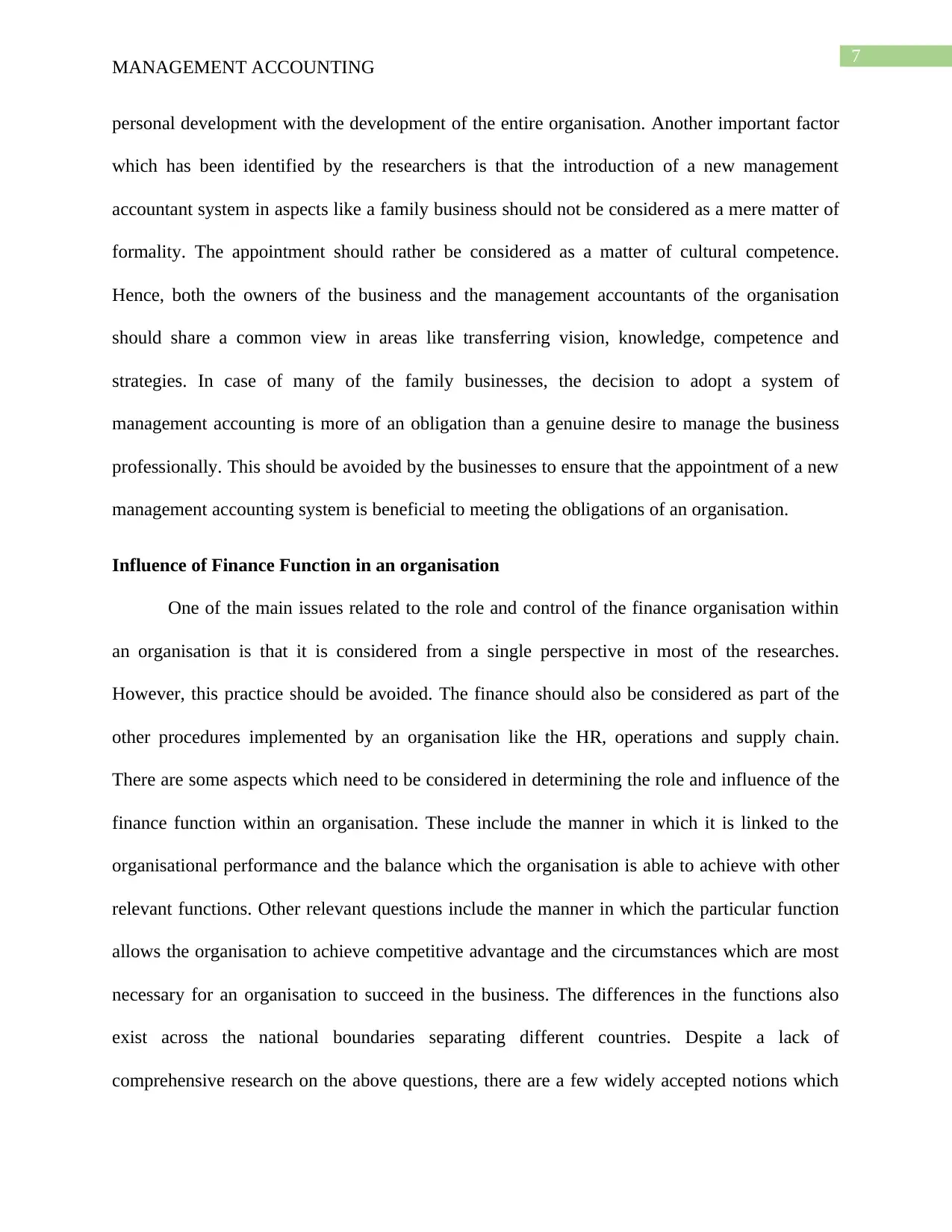
7
MANAGEMENT ACCOUNTING
personal development with the development of the entire organisation. Another important factor
which has been identified by the researchers is that the introduction of a new management
accountant system in aspects like a family business should not be considered as a mere matter of
formality. The appointment should rather be considered as a matter of cultural competence.
Hence, both the owners of the business and the management accountants of the organisation
should share a common view in areas like transferring vision, knowledge, competence and
strategies. In case of many of the family businesses, the decision to adopt a system of
management accounting is more of an obligation than a genuine desire to manage the business
professionally. This should be avoided by the businesses to ensure that the appointment of a new
management accounting system is beneficial to meeting the obligations of an organisation.
Influence of Finance Function in an organisation
One of the main issues related to the role and control of the finance organisation within
an organisation is that it is considered from a single perspective in most of the researches.
However, this practice should be avoided. The finance should also be considered as part of the
other procedures implemented by an organisation like the HR, operations and supply chain.
There are some aspects which need to be considered in determining the role and influence of the
finance function within an organisation. These include the manner in which it is linked to the
organisational performance and the balance which the organisation is able to achieve with other
relevant functions. Other relevant questions include the manner in which the particular function
allows the organisation to achieve competitive advantage and the circumstances which are most
necessary for an organisation to succeed in the business. The differences in the functions also
exist across the national boundaries separating different countries. Despite a lack of
comprehensive research on the above questions, there are a few widely accepted notions which
MANAGEMENT ACCOUNTING
personal development with the development of the entire organisation. Another important factor
which has been identified by the researchers is that the introduction of a new management
accountant system in aspects like a family business should not be considered as a mere matter of
formality. The appointment should rather be considered as a matter of cultural competence.
Hence, both the owners of the business and the management accountants of the organisation
should share a common view in areas like transferring vision, knowledge, competence and
strategies. In case of many of the family businesses, the decision to adopt a system of
management accounting is more of an obligation than a genuine desire to manage the business
professionally. This should be avoided by the businesses to ensure that the appointment of a new
management accounting system is beneficial to meeting the obligations of an organisation.
Influence of Finance Function in an organisation
One of the main issues related to the role and control of the finance organisation within
an organisation is that it is considered from a single perspective in most of the researches.
However, this practice should be avoided. The finance should also be considered as part of the
other procedures implemented by an organisation like the HR, operations and supply chain.
There are some aspects which need to be considered in determining the role and influence of the
finance function within an organisation. These include the manner in which it is linked to the
organisational performance and the balance which the organisation is able to achieve with other
relevant functions. Other relevant questions include the manner in which the particular function
allows the organisation to achieve competitive advantage and the circumstances which are most
necessary for an organisation to succeed in the business. The differences in the functions also
exist across the national boundaries separating different countries. Despite a lack of
comprehensive research on the above questions, there are a few widely accepted notions which
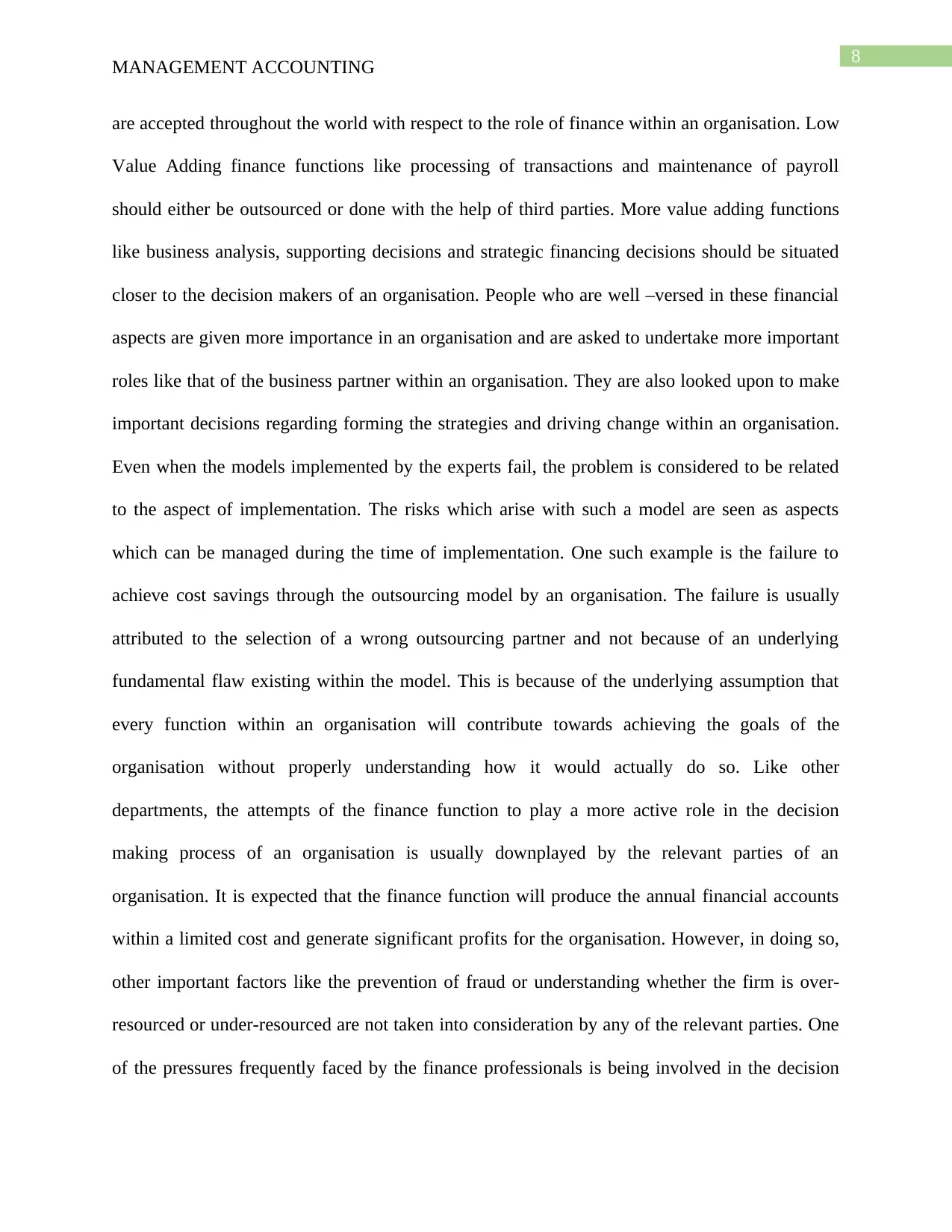
8
MANAGEMENT ACCOUNTING
are accepted throughout the world with respect to the role of finance within an organisation. Low
Value Adding finance functions like processing of transactions and maintenance of payroll
should either be outsourced or done with the help of third parties. More value adding functions
like business analysis, supporting decisions and strategic financing decisions should be situated
closer to the decision makers of an organisation. People who are well –versed in these financial
aspects are given more importance in an organisation and are asked to undertake more important
roles like that of the business partner within an organisation. They are also looked upon to make
important decisions regarding forming the strategies and driving change within an organisation.
Even when the models implemented by the experts fail, the problem is considered to be related
to the aspect of implementation. The risks which arise with such a model are seen as aspects
which can be managed during the time of implementation. One such example is the failure to
achieve cost savings through the outsourcing model by an organisation. The failure is usually
attributed to the selection of a wrong outsourcing partner and not because of an underlying
fundamental flaw existing within the model. This is because of the underlying assumption that
every function within an organisation will contribute towards achieving the goals of the
organisation without properly understanding how it would actually do so. Like other
departments, the attempts of the finance function to play a more active role in the decision
making process of an organisation is usually downplayed by the relevant parties of an
organisation. It is expected that the finance function will produce the annual financial accounts
within a limited cost and generate significant profits for the organisation. However, in doing so,
other important factors like the prevention of fraud or understanding whether the firm is over-
resourced or under-resourced are not taken into consideration by any of the relevant parties. One
of the pressures frequently faced by the finance professionals is being involved in the decision
MANAGEMENT ACCOUNTING
are accepted throughout the world with respect to the role of finance within an organisation. Low
Value Adding finance functions like processing of transactions and maintenance of payroll
should either be outsourced or done with the help of third parties. More value adding functions
like business analysis, supporting decisions and strategic financing decisions should be situated
closer to the decision makers of an organisation. People who are well –versed in these financial
aspects are given more importance in an organisation and are asked to undertake more important
roles like that of the business partner within an organisation. They are also looked upon to make
important decisions regarding forming the strategies and driving change within an organisation.
Even when the models implemented by the experts fail, the problem is considered to be related
to the aspect of implementation. The risks which arise with such a model are seen as aspects
which can be managed during the time of implementation. One such example is the failure to
achieve cost savings through the outsourcing model by an organisation. The failure is usually
attributed to the selection of a wrong outsourcing partner and not because of an underlying
fundamental flaw existing within the model. This is because of the underlying assumption that
every function within an organisation will contribute towards achieving the goals of the
organisation without properly understanding how it would actually do so. Like other
departments, the attempts of the finance function to play a more active role in the decision
making process of an organisation is usually downplayed by the relevant parties of an
organisation. It is expected that the finance function will produce the annual financial accounts
within a limited cost and generate significant profits for the organisation. However, in doing so,
other important factors like the prevention of fraud or understanding whether the firm is over-
resourced or under-resourced are not taken into consideration by any of the relevant parties. One
of the pressures frequently faced by the finance professionals is being involved in the decision
⊘ This is a preview!⊘
Do you want full access?
Subscribe today to unlock all pages.

Trusted by 1+ million students worldwide
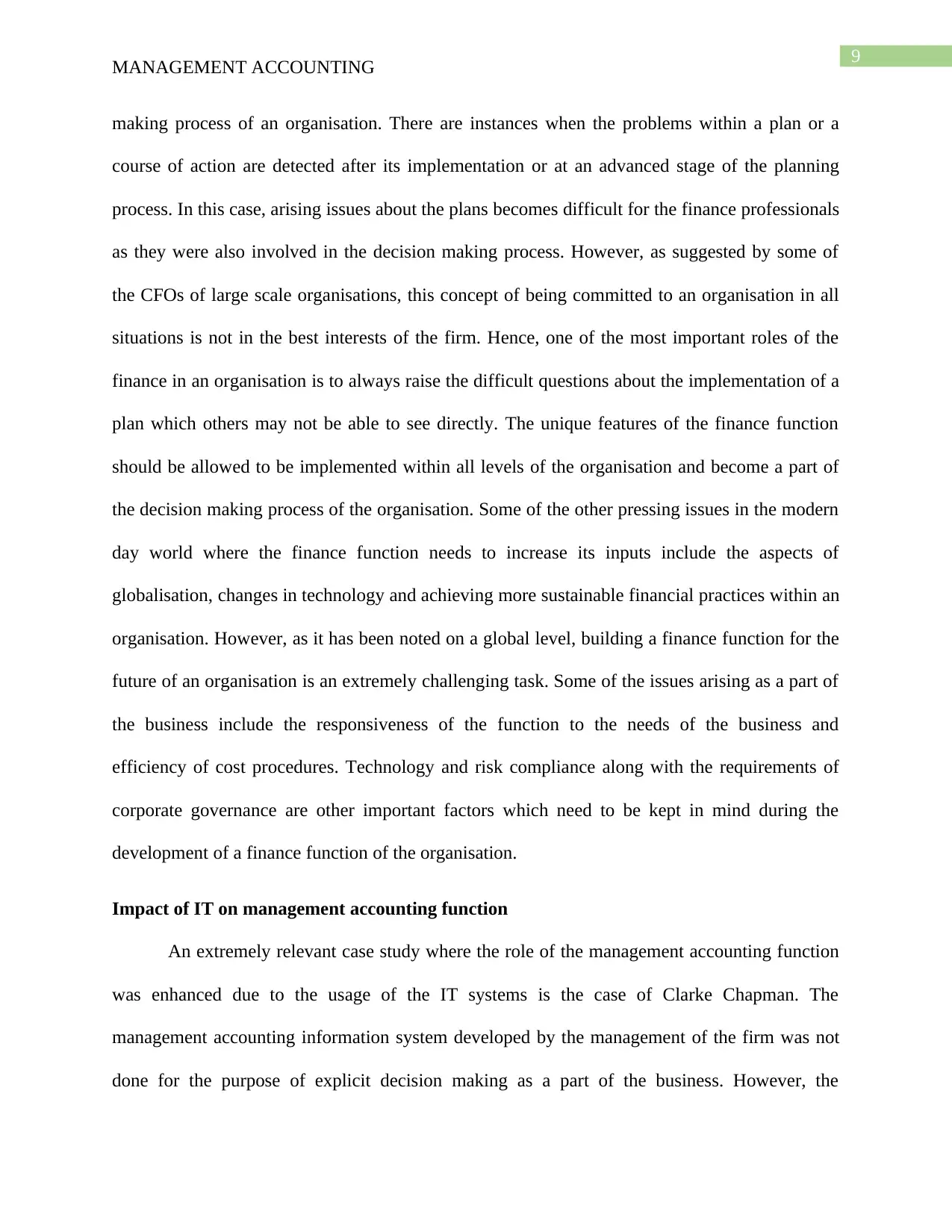
9
MANAGEMENT ACCOUNTING
making process of an organisation. There are instances when the problems within a plan or a
course of action are detected after its implementation or at an advanced stage of the planning
process. In this case, arising issues about the plans becomes difficult for the finance professionals
as they were also involved in the decision making process. However, as suggested by some of
the CFOs of large scale organisations, this concept of being committed to an organisation in all
situations is not in the best interests of the firm. Hence, one of the most important roles of the
finance in an organisation is to always raise the difficult questions about the implementation of a
plan which others may not be able to see directly. The unique features of the finance function
should be allowed to be implemented within all levels of the organisation and become a part of
the decision making process of the organisation. Some of the other pressing issues in the modern
day world where the finance function needs to increase its inputs include the aspects of
globalisation, changes in technology and achieving more sustainable financial practices within an
organisation. However, as it has been noted on a global level, building a finance function for the
future of an organisation is an extremely challenging task. Some of the issues arising as a part of
the business include the responsiveness of the function to the needs of the business and
efficiency of cost procedures. Technology and risk compliance along with the requirements of
corporate governance are other important factors which need to be kept in mind during the
development of a finance function of the organisation.
Impact of IT on management accounting function
An extremely relevant case study where the role of the management accounting function
was enhanced due to the usage of the IT systems is the case of Clarke Chapman. The
management accounting information system developed by the management of the firm was not
done for the purpose of explicit decision making as a part of the business. However, the
MANAGEMENT ACCOUNTING
making process of an organisation. There are instances when the problems within a plan or a
course of action are detected after its implementation or at an advanced stage of the planning
process. In this case, arising issues about the plans becomes difficult for the finance professionals
as they were also involved in the decision making process. However, as suggested by some of
the CFOs of large scale organisations, this concept of being committed to an organisation in all
situations is not in the best interests of the firm. Hence, one of the most important roles of the
finance in an organisation is to always raise the difficult questions about the implementation of a
plan which others may not be able to see directly. The unique features of the finance function
should be allowed to be implemented within all levels of the organisation and become a part of
the decision making process of the organisation. Some of the other pressing issues in the modern
day world where the finance function needs to increase its inputs include the aspects of
globalisation, changes in technology and achieving more sustainable financial practices within an
organisation. However, as it has been noted on a global level, building a finance function for the
future of an organisation is an extremely challenging task. Some of the issues arising as a part of
the business include the responsiveness of the function to the needs of the business and
efficiency of cost procedures. Technology and risk compliance along with the requirements of
corporate governance are other important factors which need to be kept in mind during the
development of a finance function of the organisation.
Impact of IT on management accounting function
An extremely relevant case study where the role of the management accounting function
was enhanced due to the usage of the IT systems is the case of Clarke Chapman. The
management accounting information system developed by the management of the firm was not
done for the purpose of explicit decision making as a part of the business. However, the
Paraphrase This Document
Need a fresh take? Get an instant paraphrase of this document with our AI Paraphraser
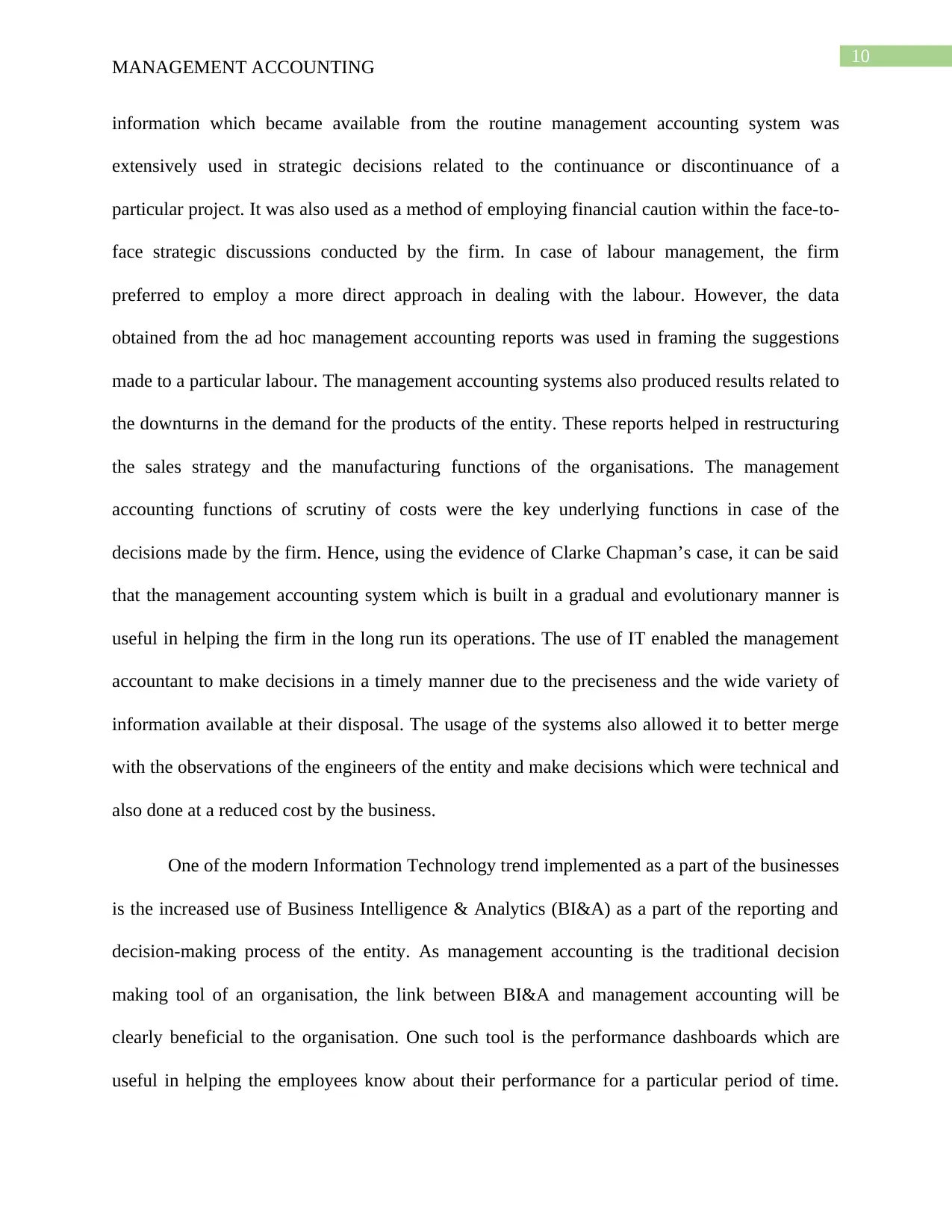
10
MANAGEMENT ACCOUNTING
information which became available from the routine management accounting system was
extensively used in strategic decisions related to the continuance or discontinuance of a
particular project. It was also used as a method of employing financial caution within the face-to-
face strategic discussions conducted by the firm. In case of labour management, the firm
preferred to employ a more direct approach in dealing with the labour. However, the data
obtained from the ad hoc management accounting reports was used in framing the suggestions
made to a particular labour. The management accounting systems also produced results related to
the downturns in the demand for the products of the entity. These reports helped in restructuring
the sales strategy and the manufacturing functions of the organisations. The management
accounting functions of scrutiny of costs were the key underlying functions in case of the
decisions made by the firm. Hence, using the evidence of Clarke Chapman’s case, it can be said
that the management accounting system which is built in a gradual and evolutionary manner is
useful in helping the firm in the long run its operations. The use of IT enabled the management
accountant to make decisions in a timely manner due to the preciseness and the wide variety of
information available at their disposal. The usage of the systems also allowed it to better merge
with the observations of the engineers of the entity and make decisions which were technical and
also done at a reduced cost by the business.
One of the modern Information Technology trend implemented as a part of the businesses
is the increased use of Business Intelligence & Analytics (BI&A) as a part of the reporting and
decision-making process of the entity. As management accounting is the traditional decision
making tool of an organisation, the link between BI&A and management accounting will be
clearly beneficial to the organisation. One such tool is the performance dashboards which are
useful in helping the employees know about their performance for a particular period of time.
MANAGEMENT ACCOUNTING
information which became available from the routine management accounting system was
extensively used in strategic decisions related to the continuance or discontinuance of a
particular project. It was also used as a method of employing financial caution within the face-to-
face strategic discussions conducted by the firm. In case of labour management, the firm
preferred to employ a more direct approach in dealing with the labour. However, the data
obtained from the ad hoc management accounting reports was used in framing the suggestions
made to a particular labour. The management accounting systems also produced results related to
the downturns in the demand for the products of the entity. These reports helped in restructuring
the sales strategy and the manufacturing functions of the organisations. The management
accounting functions of scrutiny of costs were the key underlying functions in case of the
decisions made by the firm. Hence, using the evidence of Clarke Chapman’s case, it can be said
that the management accounting system which is built in a gradual and evolutionary manner is
useful in helping the firm in the long run its operations. The use of IT enabled the management
accountant to make decisions in a timely manner due to the preciseness and the wide variety of
information available at their disposal. The usage of the systems also allowed it to better merge
with the observations of the engineers of the entity and make decisions which were technical and
also done at a reduced cost by the business.
One of the modern Information Technology trend implemented as a part of the businesses
is the increased use of Business Intelligence & Analytics (BI&A) as a part of the reporting and
decision-making process of the entity. As management accounting is the traditional decision
making tool of an organisation, the link between BI&A and management accounting will be
clearly beneficial to the organisation. One such tool is the performance dashboards which are
useful in helping the employees know about their performance for a particular period of time.
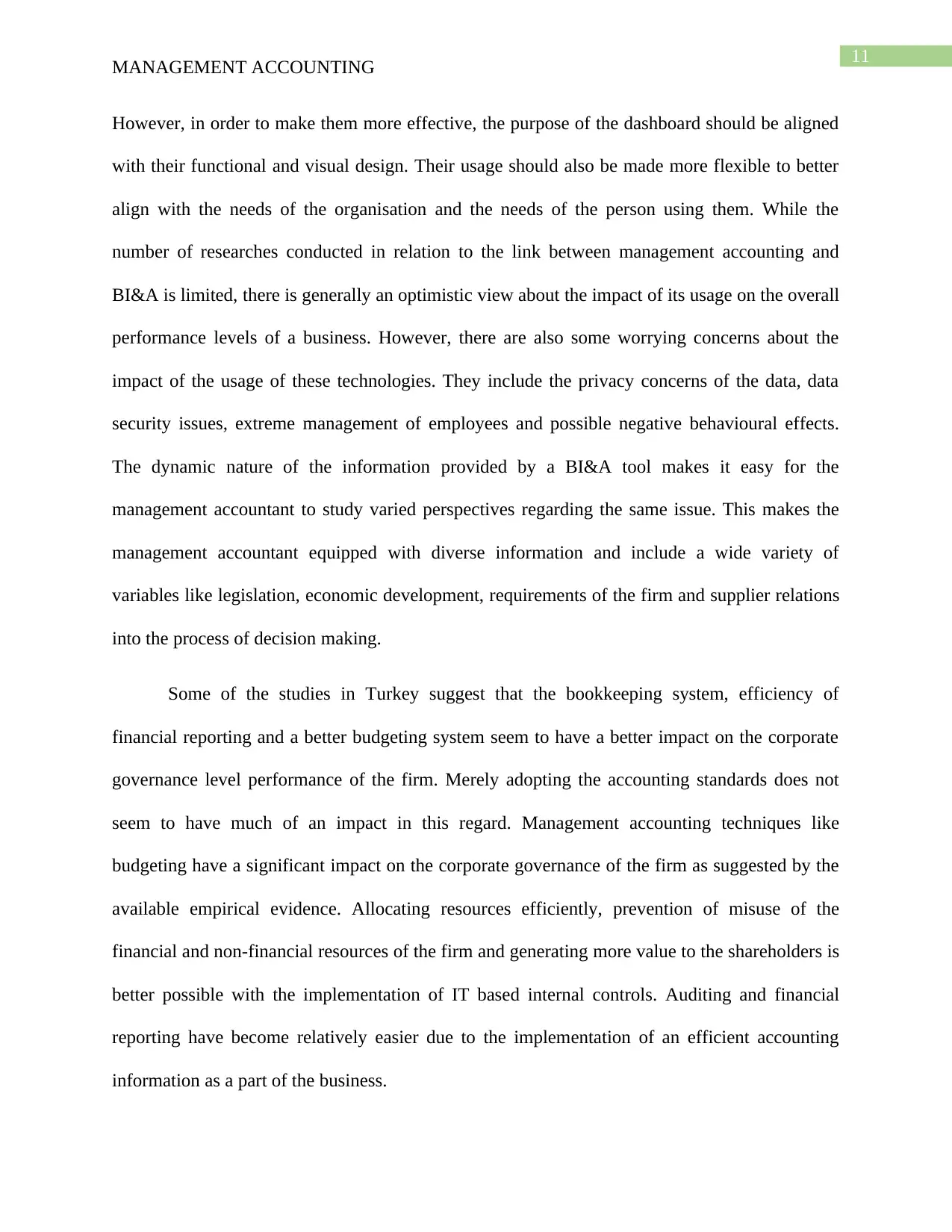
11
MANAGEMENT ACCOUNTING
However, in order to make them more effective, the purpose of the dashboard should be aligned
with their functional and visual design. Their usage should also be made more flexible to better
align with the needs of the organisation and the needs of the person using them. While the
number of researches conducted in relation to the link between management accounting and
BI&A is limited, there is generally an optimistic view about the impact of its usage on the overall
performance levels of a business. However, there are also some worrying concerns about the
impact of the usage of these technologies. They include the privacy concerns of the data, data
security issues, extreme management of employees and possible negative behavioural effects.
The dynamic nature of the information provided by a BI&A tool makes it easy for the
management accountant to study varied perspectives regarding the same issue. This makes the
management accountant equipped with diverse information and include a wide variety of
variables like legislation, economic development, requirements of the firm and supplier relations
into the process of decision making.
Some of the studies in Turkey suggest that the bookkeeping system, efficiency of
financial reporting and a better budgeting system seem to have a better impact on the corporate
governance level performance of the firm. Merely adopting the accounting standards does not
seem to have much of an impact in this regard. Management accounting techniques like
budgeting have a significant impact on the corporate governance of the firm as suggested by the
available empirical evidence. Allocating resources efficiently, prevention of misuse of the
financial and non-financial resources of the firm and generating more value to the shareholders is
better possible with the implementation of IT based internal controls. Auditing and financial
reporting have become relatively easier due to the implementation of an efficient accounting
information as a part of the business.
MANAGEMENT ACCOUNTING
However, in order to make them more effective, the purpose of the dashboard should be aligned
with their functional and visual design. Their usage should also be made more flexible to better
align with the needs of the organisation and the needs of the person using them. While the
number of researches conducted in relation to the link between management accounting and
BI&A is limited, there is generally an optimistic view about the impact of its usage on the overall
performance levels of a business. However, there are also some worrying concerns about the
impact of the usage of these technologies. They include the privacy concerns of the data, data
security issues, extreme management of employees and possible negative behavioural effects.
The dynamic nature of the information provided by a BI&A tool makes it easy for the
management accountant to study varied perspectives regarding the same issue. This makes the
management accountant equipped with diverse information and include a wide variety of
variables like legislation, economic development, requirements of the firm and supplier relations
into the process of decision making.
Some of the studies in Turkey suggest that the bookkeeping system, efficiency of
financial reporting and a better budgeting system seem to have a better impact on the corporate
governance level performance of the firm. Merely adopting the accounting standards does not
seem to have much of an impact in this regard. Management accounting techniques like
budgeting have a significant impact on the corporate governance of the firm as suggested by the
available empirical evidence. Allocating resources efficiently, prevention of misuse of the
financial and non-financial resources of the firm and generating more value to the shareholders is
better possible with the implementation of IT based internal controls. Auditing and financial
reporting have become relatively easier due to the implementation of an efficient accounting
information as a part of the business.
⊘ This is a preview!⊘
Do you want full access?
Subscribe today to unlock all pages.

Trusted by 1+ million students worldwide
1 out of 19
Related Documents
Your All-in-One AI-Powered Toolkit for Academic Success.
+13062052269
info@desklib.com
Available 24*7 on WhatsApp / Email
![[object Object]](/_next/static/media/star-bottom.7253800d.svg)
Unlock your academic potential
Copyright © 2020–2025 A2Z Services. All Rights Reserved. Developed and managed by ZUCOL.





